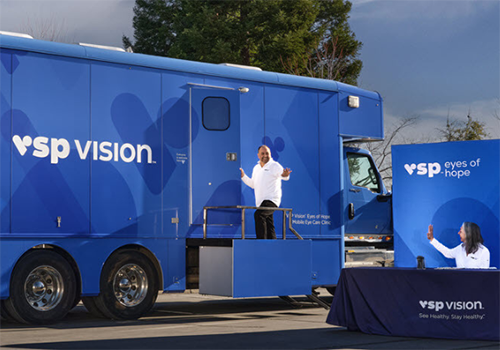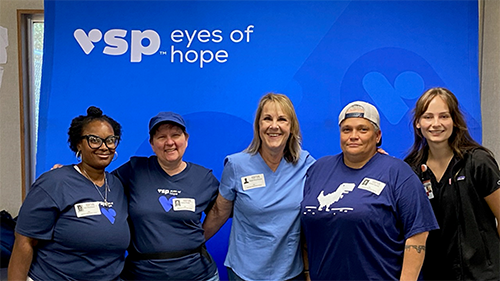Serving Children Living in Medical Deserts: A New Model of Care
Helping Children Learn by Closing Access Gaps
 Nearly one-third of the U.S. population (121 million people) lives in a healthcare desert, an area with insufficient access to primary care providers, pharmacies, hospitals, trauma centers, and community health centers. This includes many of the more than 3,400 children who attend the Enterprise School District serving Redding, California.
Nearly one-third of the U.S. population (121 million people) lives in a healthcare desert, an area with insufficient access to primary care providers, pharmacies, hospitals, trauma centers, and community health centers. This includes many of the more than 3,400 children who attend the Enterprise School District serving Redding, California.
VSP® Vision Care, collaborating with Partnership Health Plan, a client of our government programs, and the school district, decided to do something about it. The result was the delivery of high-quality vision care to 153 children and the development of a new model for closing gaps in care in the communities VSP serves.
Enterprise School District is one of thousands across the country that conduct regular vision screenings for students. This is important because one out of four children across the country struggle with reading and learning due to undiagnosed vision problems.
Screenings are only the first step to getting corrective lenses for children who need them. According to VSP network provider Dr. Danielle Richardson, “screenings…detect the presence of ocular or visual health issues.” Screenings are typically not able to detect subtle vision issues that can contribute to problems in school. This is why positive screenings are ideally followed by a referral to a local optometrist for a comprehensive eye examination that confirms the presence of ocular or visual issues and provides a prescription to help correct the problem.
 While the Enterprise School District conducts regular vision screenings, the lack of optometrists in the region makes it difficult for families to find an eye doctor to provide a follow-up exam. This problem is more acute for those families who use Medi-Cal to help manage their health.
While the Enterprise School District conducts regular vision screenings, the lack of optometrists in the region makes it difficult for families to find an eye doctor to provide a follow-up exam. This problem is more acute for those families who use Medi-Cal to help manage their health.
Kelly Pagan, Head of Elementary School Health Services for the Enterprise School District, in an October 2024 interview with local news KRCR, said, “I can't imagine trying to attend school and learn to read and write if you can’t see the board or you can’t see what you’re reading. It’s just critical that students can see what we are teaching them."
In 2024, Pagan turned to VSP to assist in finding a way to close this gap in care. Ultimately, a team with many players was formed with the goal of ensuring access to licensed, in-network vision providers who could deliver comprehensive vision exams and get glasses to kids who needed them. In this case, insurance coverage wasn’t the issue that often drives the organization of mobile health care clinics. The problem in Redding is simply one of access due to the lack of sufficient licensed optometric providers.
Together, this group organized a four-day vision clinic that deployed the VSP Mobile Response Team (MRT) and Eyes of Hope mobile van alongside a credentialed telehealth partner to provide comprehensive vision exams for 153 children who didn’t have easy access to an eye doctor. More than 85% of the students were identified as needing glasses. The kids were given the option of picking out a pair of frames on site. The glasses, which were made by the VSP Folsom Lab and provided at no cost, were delivered to the children via the district’s office of Elementary School Health Services office.
“I am proud that responding to a request from our client Partnership Health Plan helped the VSP team find new ways to close gaps in care,” says Sara Arredondo, Senior Key Account Manager for the VSP Government Market Solutions team.
The Mobile Response Team (MRT), which took the lead in delivering care to the Enterprise School District, debriefed the lessons learned from this incredibly successful event.
“Was this a perfect event with no hitches? No. VSP learned much, including how to better support Medicaid members moving forward,” said Sara Mashburn, Senior Business Analyst with VSP. “Nurse Kelly Pagan has already asked for VSP to be available in 2025 and the MRT is already planning for this.”
The MRT is typically deployed to provide disaster support and free care to the uninsured. Providing mobile services for children with insurance coverage required subtle and significant changes to standard operating procedures. This included ensuring the people checking children in for their appointments had the tools to securely collect data needed for insurance billing, and ensuring there was sufficient staff and volunteer support to manage two sites operating simultaneously. These and related challenges were overcome, and the MRT is actively working to adapt their care model to scale this type of mobile event to help close critical access gaps to help children in other communities we serve.
To learn more, contact us to schedule a free consultation with VSP.